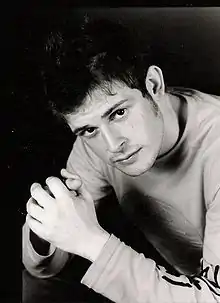мужчина
Russian

Etymology
Attested since the 16th century as мущи́на (muščína)[1], from Old East Slavic *мужьщина (*mužĭščina), from Proto-Slavic *mǫžьščina, from *mǫžьskъ + *-ina, from *mǫžь + *-ьskъ. Synchronically analyzable as мужско́й (mužskój) + -ина (-ina). Cognates include Ukrainian мужчи́на (mužčýna), Belarusian мужчы́на (mužčýna).
The word is still pronounced in a way that is directly rendered by this outdated spelling мущи́на (muščína), but the current spelling more explicitly displays the etymology and the even older Slavic sound structure.
Мужчина is one of a few masculine nouns that ends in а, and declines with the same endings as a feminine noun would, but always takes adjectives with masculine endings. For example, “я вижу смелого мужчину.»
Pronunciation
- IPA(key): [mʊˈɕːinə]
Audio (file)
Noun
мужчи́на • (mužčína) m anim (genitive мужчи́ны, nominative plural мужчи́ны, genitive plural мужчи́н, related adjective мужско́й, augmentative мужчи́нище)
- man (male person)
Declension
| singular | plural | |
|---|---|---|
| nominative | мужчи́на mužčína |
мужчи́ны mužčíny |
| genitive | мужчи́ны mužčíny |
мужчи́н mužčín |
| dative | мужчи́не mužčíne |
мужчи́нам mužčínam |
| accusative | мужчи́ну mužčínu |
мужчи́н mužčín |
| instrumental | мужчи́ной, мужчи́ною mužčínoj, mužčínoju |
мужчи́нами mužčínami |
| prepositional | мужчи́не mužčíne |
мужчи́нах mužčínax |
| singular | plural | |
|---|---|---|
| nominative | мужчи́на mužčína |
мужчи́ны mužčíny |
| genitive | мужчи́ны mužčíny |
мужчи́нъ mužčín |
| dative | мужчи́нѣ mužčíně |
мужчи́намъ mužčínam |
| accusative | мужчи́ну mužčínu |
мужчи́нъ mužčín |
| instrumental | мужчи́ной, мужчи́ною mužčínoj, mužčínoju |
мужчи́нами mužčínami |
| prepositional | мужчи́нѣ mužčíně |
мужчи́нахъ mužčínax |
References
- Filin, F. P., editor (1982), “мужчина (мущина)”, in Словарь русского языка XI–XVII вв. [Dictionary of the Russian Language: 11ᵗʰ – 17ᵗʰ cc.] (in Russian), issue 9 (м – мяшин-), Moscow: Nauka, page 305
- Trubachyov, Oleg, editor (1994), “*mǫžьščina”, in Этимологический словарь славянских языков [Etymological Dictionary of Slavic Languages] (in Russian), issue 20 (*morzatъjь – *mъrsknǫti), Moscow: Nauka, →ISBN, page 166
- Vasmer, Max (1964–1973), “мущина”, in Этимологический словарь русского языка [Etymological Dictionary of the Russian Language] (in Russian), transl. and suppl. by Oleg Trubachyov, Moscow: Progress
Ukrainian
Etymology
From Proto-Slavic *mǫžьščina. Cognates include Russian мужчи́на (mužčína), Belarusian мужчы́на (mužčýna).
Pronunciation
- IPA(key): [mʊʒˈt͡ʃɪnɐ]
Audio (file)
Noun
мужчи́на • (mužčýna) m pers (genitive мужчи́ни, nominative plural мужчи́ни, genitive plural мужчи́н)
Declension
| singular | plural | |
|---|---|---|
| nominative | мужчи́на mužčýna |
мужчи́ни mužčýny |
| genitive | мужчи́ни mužčýny |
мужчи́н mužčýn |
| dative | мужчи́ні mužčýni |
мужчи́нам mužčýnam |
| accusative | мужчи́ну mužčýnu |
мужчи́н mužčýn |
| instrumental | мужчи́ною mužčýnoju |
мужчи́нами mužčýnamy |
| locative | мужчи́ні mužčýni |
мужчи́нах mužčýnax |
| vocative | мужчи́но mužčýno |
мужчи́ни mužčýny |
References
- Bilodid, I. K., editor (1970–1980), “мужчина”, in Словник української мови: в 11 т. [Dictionary of the Ukrainian Language: in 11 vols] (in Ukrainian), Kyiv: Naukova Dumka
- “мужчина”, in Горох – Словозміна [Horokh – Inflection] (in Ukrainian)